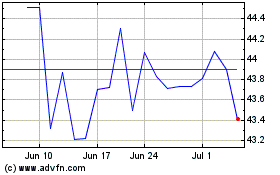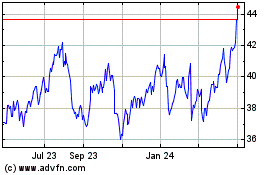HSBC to Slash Thousands of Jobs After Ousting CEO -- 2nd Update
August 05 2019 - 1:56PM
Dow Jones News
By Margot Patrick
HSBC Holdings PLC went into defense mode Monday to cope with a
worsening outlook for the global economy, ousting Chief Executive
John Flint and saying it will roll back spending and slash
thousands of jobs.
The bank, one of the world's largest lenders to households and
companies and in financing global trade, said the changing
conditions led it to part ways with Mr. Flint, 51, who was CEO for
just 18 months in a three-decade career at the bank. Chairman Mark
Tucker said Mr. Flint's departure doesn't signal any change in
strategy, but that the board felt a leadership shift was needed to
respond to "an increasingly complex and challenging global
environment."
"Circumstances change and we need to adapt," Mr. Tucker
said.
The move comes as HSBC feels pressure across some of its largest
markets, including in Asia, where the U.S.-China trade dispute is
curbing foreign investment and drawing new supply chain lines for
manufacturers. In Britain, where the bank is based, a pending exit
from the European Union is denting consumer and business confidence
and raises the prospect of a possible recession.
The bank is also still in the midst of a multiyear turnaround of
its U.S. subsidiary, and recently hired a Citigroup Inc. veteran to
pick up the pace of the restructuring there. It joins other global
banks including Barclays PLC and Deutsche Bank AG in making job
cuts to counteract revenue declines.
HSBC stock fell 3% in a broadly lower market after President
Trump said China manipulated its currency, a sentiment that
highlighted HSBC's risks in navigating geopolitical tensions.
In an interview Monday, HSBC's finance director Ewen Stevenson
said up to 2% of the bank's 237,685 employees could lose their
jobs. He said the cuts, aimed at shaving up to 4% off HSBC's wage
costs, target senior roles and will come from a mix of layoffs and
attrition as people leave for other jobs. HSBC said severance costs
this year would be $650 million to $700 million, saving it around
that much annually going forward.
The company said it would also pull back on spending plans Mr.
Flint announced in June 2018 when the economic outlook was better,
paring planned investments in areas such as digital banking and
productivity improvement down to a lower range of $14.5 billion to
$15 billion over the three years to 2020, from a $15 billion to $17
billion target.
Mr. Flint's sudden departure after such a short tenure by CEO
standards surprised analysts and investors, and for some left open
the possibility of more significant strategic shifts to come,
including continuing to shrink its global footprint.
HSBC late Sunday said Mr. Flint had agreed to leave the CEO job
to make way for new leadership. The move came after months of
concern over Mr. Flint's leadership style and ability to take
decisive action, people familiar with the bank said. He was
formally dismissed at a London board meeting Sunday, the people
said.
Joseph Dickerson, a banks analyst at Jefferies, said the board
decision showed it "isn't afraid to make tough decisions," and
should be taken positively by investors as a sign of strong
governance.
Mr. Tucker said the bank will consider a mix of internal and
external candidates to take over. Noel Quinn, who has been head of
global commercial banking, is taking the job in the meantime and is
seen as a possible candidate.
Mr. Flint was regarded as a safe choice when he was selected by
Mr. Tucker and the board for the role in late 2017. He had been a
top pick and protégé of the CEO he replaced, Stuart Gulliver, who
led HSBC through a radical strategic overhaul after the financial
crisis. The bank, founded in Hong Kong in 1865 to finance trade in
Asia and with the West, had swelled into a banking behemoth with
branches and offices in 87 countries, but was weakened by the
financial crisis and a subsequent regulatory crackdown.
One of Mr. Flint's tasks had been to simplify the bank, and Mr.
Tucker on Monday said that mission would continue. It is now
present in around 65 countries.
HSBC posted $4.37 billion in net profit for the second quarter,
up from $4.1 billion in the prior-year quarter, on higher
revenue.
Write to Margot Patrick at margot.patrick@wsj.com
(END) Dow Jones Newswires
August 05, 2019 13:41 ET (17:41 GMT)
Copyright (c) 2019 Dow Jones & Company, Inc.
HSBC (NYSE:HSBC)
Historical Stock Chart
From Mar 2024 to Apr 2024

HSBC (NYSE:HSBC)
Historical Stock Chart
From Apr 2023 to Apr 2024
